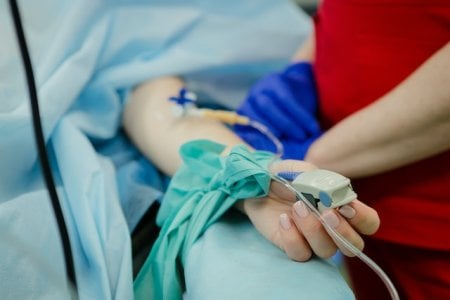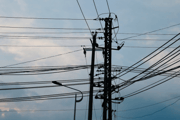Shocking health warning: Man dies in hospital following dangerous bacteria outbreak
By
Seia Ibanez
- Replies 9
We could all do without worrying about the dangers of everyday life, right? But unfortunately, sometimes we just don't have much choice.
That's certainly the case when it comes to our health; we are vulnerable in more ways than one. Because of this, we have to be vigilant about our health at all times.
A man has tragically lost his life at Buderim Hospital on the Sunshine Coast, Queensland, due to a bacterial outbreak, leading to an urgent health warning about contaminated saline products.
The incident has raised concerns about the safety of medical supplies in hospitals, and investigations are underway to determine the extent of the contamination.
His death has been linked to the use of two specific InterPharma sodium chloride products, which are believed to be contaminated with Ralstonia pickettii, a bacteria typically found in moist environments, such as soil, rivers, and plants.
This bacteria, while generally harmless in its natural environment, can lead to severe invasive infections, including septic shock and death for immunosuppressed people, when introduced into the human bloodstream.
Queensland Health has issued an urgent quarantine notice for the implicated saline products. Chief Health Officer Dr John Gerrard explained that while Ralstonia pickettii is a common organism in water bodies, it should not be present in sterile medical supplies.
‘It grows naturally in water in lakes and streams and rivers, but it shouldn’t obviously be in sterile samples,’ he said.
‘We see it occasionally, it’s common out there, it’s in water samples, but you don’t normally see it in human samples.’
‘For the most part, it is harmless, but if it’s injected into the bloodstream, it’s harmful.’
‘It cannot spread from one person or another.’
In response to the incident, all contaminated saline products have been removed from Queensland hospitals and replaced with products from a different supplier.
‘This particular supplier was not used extensively in Queensland public hospitals,’ Dr Gerrard assured.
‘There were seven public hospitals that use this product, it was removed.’
Dr Gerrard also shared that the lab results showed the organism present in the man’s blood. The coroner would investigate the incident further. The remaining cases, however, were found in wound swabs from infected patients but were only mild cases.
‘I am unable to confirm how it contributed to the death,’ he said.
While the incident has raised alarm bells, it is not the first time such an outbreak has occurred.
Dr Gerrard recalled a similar incident in 1990, where 19 people were infected, resulting in six deaths. All those infected had ongoing medical conditions and were receiving the saline treatment intravenously, which allowed the bacteria to enter their bloodstream.
Dr Paul Griffin, an Infectious Disease Physician and Clinical Microbiologist at Queensland University, echoed Dr Gerrard's sentiments.
He explained that Ralstonia pickettii is a prevalent environmental bacteria that is generally harmless.
‘It’s quite a common environmental organism,’ Dr Paul said.
‘We know that there are lots of these bacterial organisms that live happily in things like soil and riverbeds.’
‘It actually very rarely causes infections, our bodies’ defences are pretty good at keeping it at bay, but not so in this case with the specifics of the situation, it was in a product that was used in a hospital setting where we have vulnerable patients.’
Dr Griffin added that how the saline solution was used created access to bacteria in the body.
‘This type of product was one that was used to rinse or irrigate wounds, bypassing the defences of the skin or potentially used to dilute intravenously administered medications, and therefore it got in systemically,’ he said.
It is believed that there are 44 infections nationwide linked to the contaminated saline. Queensland Health has issued an internal patient safety alert, urging all their medical facilities to 'urgently quarantine' the products.
The alert stated: ‘These products should be removed from all clinical areas immediately and not be used for patient care until further advised.’
‘Queensland Health is instituting an urgent quarantine of the above products, which are suspected to be linked to a number of Ralstonia pickettii outbreaks in multiple states and territories.’
‘Immediately check for, and quarantine, affected products,’ it added.
This situation wasn’t the first time Ralstonia impacted a medical treatment, said Dr. Griffin.
‘We know that solutions and medications are produced to a very high standard, and we see contamination happen very rarely, but these types of germs are so common in the environment and so hardy that they can survive and remain viable,’ he said.
‘We have seen Ralstonia in other medical fluids in the past, including what I believe was an antiseptic agent, it happens fairly rarely, but when it does happen, we want to get on top of it very quickly.’
The incident also sparked a nationwide investigation, with the Australian Therapeutic Goods Administration also looking into the outbreak. Other states are aware of the recall, and it remains unclear how the products became contaminated with the soil-based bacteria.
‘I don’t want to say confidently that all risk has been removed,’ Dr Gerrard said.
‘The known samples…in Queensland…have been removed.’
In similar news, if you have been taking advantage of the sun to pot in your garden, you have to be aware of the possible risks.
In a recent article, the NSW Health Executive Director warned about the potentially devastating consequences of contact with a bacteria that causes Legionnaires’ disease. Read more about the story here.
 Have you or a loved one been affected by this outbreak? Share your experiences and thoughts in the comments below.
Have you or a loved one been affected by this outbreak? Share your experiences and thoughts in the comments below.
That's certainly the case when it comes to our health; we are vulnerable in more ways than one. Because of this, we have to be vigilant about our health at all times.
A man has tragically lost his life at Buderim Hospital on the Sunshine Coast, Queensland, due to a bacterial outbreak, leading to an urgent health warning about contaminated saline products.
The incident has raised concerns about the safety of medical supplies in hospitals, and investigations are underway to determine the extent of the contamination.
His death has been linked to the use of two specific InterPharma sodium chloride products, which are believed to be contaminated with Ralstonia pickettii, a bacteria typically found in moist environments, such as soil, rivers, and plants.
This bacteria, while generally harmless in its natural environment, can lead to severe invasive infections, including septic shock and death for immunosuppressed people, when introduced into the human bloodstream.
Queensland Health has issued an urgent quarantine notice for the implicated saline products. Chief Health Officer Dr John Gerrard explained that while Ralstonia pickettii is a common organism in water bodies, it should not be present in sterile medical supplies.
‘It grows naturally in water in lakes and streams and rivers, but it shouldn’t obviously be in sterile samples,’ he said.
‘We see it occasionally, it’s common out there, it’s in water samples, but you don’t normally see it in human samples.’
‘For the most part, it is harmless, but if it’s injected into the bloodstream, it’s harmful.’
‘It cannot spread from one person or another.’
In response to the incident, all contaminated saline products have been removed from Queensland hospitals and replaced with products from a different supplier.
‘This particular supplier was not used extensively in Queensland public hospitals,’ Dr Gerrard assured.
‘There were seven public hospitals that use this product, it was removed.’
Dr Gerrard also shared that the lab results showed the organism present in the man’s blood. The coroner would investigate the incident further. The remaining cases, however, were found in wound swabs from infected patients but were only mild cases.
‘I am unable to confirm how it contributed to the death,’ he said.
While the incident has raised alarm bells, it is not the first time such an outbreak has occurred.
Dr Gerrard recalled a similar incident in 1990, where 19 people were infected, resulting in six deaths. All those infected had ongoing medical conditions and were receiving the saline treatment intravenously, which allowed the bacteria to enter their bloodstream.
Dr Paul Griffin, an Infectious Disease Physician and Clinical Microbiologist at Queensland University, echoed Dr Gerrard's sentiments.
He explained that Ralstonia pickettii is a prevalent environmental bacteria that is generally harmless.
‘It’s quite a common environmental organism,’ Dr Paul said.
‘We know that there are lots of these bacterial organisms that live happily in things like soil and riverbeds.’
‘It actually very rarely causes infections, our bodies’ defences are pretty good at keeping it at bay, but not so in this case with the specifics of the situation, it was in a product that was used in a hospital setting where we have vulnerable patients.’
Dr Griffin added that how the saline solution was used created access to bacteria in the body.
‘This type of product was one that was used to rinse or irrigate wounds, bypassing the defences of the skin or potentially used to dilute intravenously administered medications, and therefore it got in systemically,’ he said.
It is believed that there are 44 infections nationwide linked to the contaminated saline. Queensland Health has issued an internal patient safety alert, urging all their medical facilities to 'urgently quarantine' the products.
The alert stated: ‘These products should be removed from all clinical areas immediately and not be used for patient care until further advised.’
‘Queensland Health is instituting an urgent quarantine of the above products, which are suspected to be linked to a number of Ralstonia pickettii outbreaks in multiple states and territories.’
‘Immediately check for, and quarantine, affected products,’ it added.
This situation wasn’t the first time Ralstonia impacted a medical treatment, said Dr. Griffin.
‘We know that solutions and medications are produced to a very high standard, and we see contamination happen very rarely, but these types of germs are so common in the environment and so hardy that they can survive and remain viable,’ he said.
‘We have seen Ralstonia in other medical fluids in the past, including what I believe was an antiseptic agent, it happens fairly rarely, but when it does happen, we want to get on top of it very quickly.’
The incident also sparked a nationwide investigation, with the Australian Therapeutic Goods Administration also looking into the outbreak. Other states are aware of the recall, and it remains unclear how the products became contaminated with the soil-based bacteria.
‘I don’t want to say confidently that all risk has been removed,’ Dr Gerrard said.
‘The known samples…in Queensland…have been removed.’
In similar news, if you have been taking advantage of the sun to pot in your garden, you have to be aware of the possible risks.
In a recent article, the NSW Health Executive Director warned about the potentially devastating consequences of contact with a bacteria that causes Legionnaires’ disease. Read more about the story here.
Key Takeaways
- An urgent alert has been issued by Queensland Health over potentially contaminated saline products following a man's death and 44 reported infections.
- The saline products supplied by InterPharma are believed to be contaminated with Ralstonia pickettii, a bacteria that can lead to septic shock and death in immunosuppressed people.
- Authorities are investigating if further contaminated saline products exist in Australian hospitals. All contaminated products have been replaced with products from a different supplier.
- Queensland Health has issued a call to 'urgently quarantine' the suspected products across all their medical facilities. The Australian Therapeutic Goods Administration is also investigating the outbreak nationally.








